This year’s UN Ocean Conference, co-hosted by Portugal and Kenya, has begun on June 27 (soon after the World Ocean Day earlier this month) and will last until July 1.
In his opening remarks, UN Secretary-General António Guterres, who is from Lisbon himself, referred to the present situation as an “ocean emergency” and described the meeting as a “historic opportunity to turn the tide.”
"We have taken the ocean for granted, and today we face what I would call an 'Ocean Emergency'."
— @antonioguterres urges everyone, everywhere, to help turn the tide & commit to protecting our planet at the UN Ocean Conference. https://t.co/i62Lk8ed9l #SaveOurOcean pic.twitter.com/5IQS9WpCEI
— United Nations (@UN) June 27, 2022
“Sadly, we have taken the ocean for granted and today we face what I would call an ocean emergency. We must turn the tide […] A healthy and productive ocean is vital to our shared future,” he said.
Sure enough, as the earth’s largest biosphere, the ocean is vital for many reasons. It nurtures 80% of life on our planet, generates 50% of the oxygen we breathe and absorbs 25% of all carbon dioxide emissions, providing food, jobs, minerals and energy needed for life on the planet to survive.
However, research clearly finds that the ocean is facing unprecedented threats as a result of human activities. Low-level nations and coastal cities face flooding, more frequently and more intensely; meanwhile overfishing is rife while global warming continues to cause coral bleaching, which, alongside wastewater and plastic pollution, creates vast coastal “dead zones” and leads to declining marine species populations.
By 2050 there could be more plastic than fish in the ocean.
We need to #ActNow to #SaveOurOcean. 🐟🌊🪸
Here's how the UN Ocean Conference in Portugal is implementing good #ClimateAction practices. https://t.co/k39IgoLnWA pic.twitter.com/QR3HTGqUFC
— United Nations (@UN) June 29, 2022
The science also clearly shows that the ocean’s ability to sustain life and health will only deteriorate as the world population grows and human activities increase. Protecting our oceans is therefore imperative for tackling climate change, food insecurity, future diseases and pandemics, diminishing biodiversity, and economic inequality.
Pressure builds to achieve SDG 14
The plan to manage the ocean sustainably is set out in the targets of the UN Sustainable Development Goal (SDG) 14: Life Below Water, which was adopted in 2015 as an integral aspect of the 2030 Agenda for Sustainable Development and its set of 17 transformative goals.
Goal 14 stresses the need to conserve and sustainably use the world’s oceans, seas, and marine resources.
The advancement of Goal 14 is guided by specific targets for tackling marine pollution, improving marine and coastal ecosystems protection, minimising acidification, ending illegal overfishing, and increasing investment in scientific knowledge and marine technology, among other things.
Meanwhile, the World Meteorological Organisation found that sea-level rise, ocean heating and acidification, as well as greenhouse gas concentrations, all reached record levels last year.
In March, UN member states were criticised by scientists and environmentalists for failing to agree on a blueprint for protecting the high seas against exploitation.
Subsequently, the overarching theme of the UNOC is achieving Goal 14, with a focus on finding and financing technology-driven innovative solutions to build ocean resilience.
The event is part of the Decade of Ocean Science for Sustainable Development (2021–30), a framework to ensure that ocean science can support countries in sustainable ocean management and help them achieve the 2030 Agenda for Sustainable Development – through the creation of a new foundation, across the science-policy interface, to strengthen the management of the ocean and coasts for the benefit of humanity.
Days 1 and 2: What happened so far?
On Monday, Guterres stated that it is the “egoism” of some nations that is stopping the agreement of a long-awaited ocean protection treaty. Although he did reference the progress made since the last UNOC in 2017, such as on the UN high seas treaty, and last week’s World Trade Organisation agreement to curb harmful fishing subsidies, he issued a call to governments to raise their ambitions on global health, including more funding for scientific innovation to reach SDG 14, currently the least funded of all the SDGs.
In Lisbon, Guterres called for sustainable ocean management solutions to protect the most vulnerable coastal areas and people.
President of Kenya and event co-president Jomo Kenyatta then added that “Poor management reduced the ocean’s natural ability to restore itself,” before urging delegates to shift from ideas to action.
Portuguese president and the other co-president of the Conference Marcelo Rebelo de Sousa followed, stating that “oceans are central in the geopolitical balance of power” and that war and the pandemic must not be used as an excuse for inaction.
Some delegates were eager to share ideas for solving the most pressing challenges and offer support for further ambitious global agreements regarding oceans while others stuck to well-known keywords and did not offer much support.
Related Articles: Using the Ocean As a Tool for Global Economic Recovery | Can Stock Market Theory Save the World’s Coral Reefs?
On Tuesday, delegates attended a general debate where interactive dialogues convened in parallel to the plenary discussions. The debate saw renewed support for the conclusion to negotiations on the conservation and sustainable use of marine biodiversity in areas beyond national jurisdiction, as well as for a new treaty on plastic pollution.
A number of countries registered new voluntary commitments to achieve SDG 14. For instance, Belize committed to protecting 30% of its marine area by 2030, and Singapore vowed to launch research initiatives on tracking fish populations and marine impacts of climate change.
Others instead shared ongoing challenges related to the lack of financial, technical, and legal support for ocean action.
Predicted outcomes of the UN Ocean Conference
The draft declaration of the conference currently acknowledges the world’s collective failure to achieve SDG14 and commits to improving the health of the ocean, stressing the need for financing for developing countries to help implement Marine Protected Areas. The draft, however, does not elaborate on how exactly this will be achieved.
The final draft of the political declaration is expected to be adopted at the end of the conference, before further negotiations between nations on the Global Ocean Treaty (protecting 30% of the ocean by 2030) that are scheduled to take place in New York in August.
Ahead of UNOC 2022, the World Economic Forum published a report on how to fund SDG 14. The key takeaways include a focus on the huge potential of the private sector to help achieve SDG14 on time, in line with the Sustainable Blue Economy Finance Principles.
At the Conference, Guterres also offered recommendations for achieving this practically, including investment in sustainable ocean economies for food and renewable energy; using the ocean as a model for managing global problems for the greater good; protecting the ocean and people whose lives and livelihoods depend on them; and investing in an early warning system to protect coastal communities.
Doing all this effectively requires much more research supported by adequate infrastructures and investments, Guterres asserted.
In sum, if ambitious plans and goals are matched with adequate funding, technical expertise and additional human resources, their impact could be wider.
The UNOC 2022 is thus an important space to explore mechanisms to increase funding for SDG14 activities, as well as to engage people in individual activities to reach goals and actions to leverage wider impacts such as countries’ voluntary commitments. Progress has been made since 2017, as seen in the UN Department of Economic and Social Affairs’ findings that voluntary commitments made during and after 2017 have collectively furthered the attainment of SDG14.
Let’s hope that the UNOC 2022 can strengthen action on reaching and financing SDG 14, our best, most comprehensive and perhaps only true roadmap for preserving our Ocean on the global level.
I apologize to youth on behalf of my generation for not having protected the ocean.
This week’s UN Ocean Conference will be key to find ways to #SaveOurOcean for the benefit of people and planet.
I count on young people's strength, dynamism and action to rescue our planet. pic.twitter.com/T0vGpqa5XX
— António Guterres (@antonioguterres) June 26, 2022
Editor’s Note: The opinions expressed here by Impakter.com columnists are their own, not those of Impakter.com — In the Featured Photo: Atlantic Ocean Waves. Featured Photo Credit: Schäferle/GPA Photo Archive.












